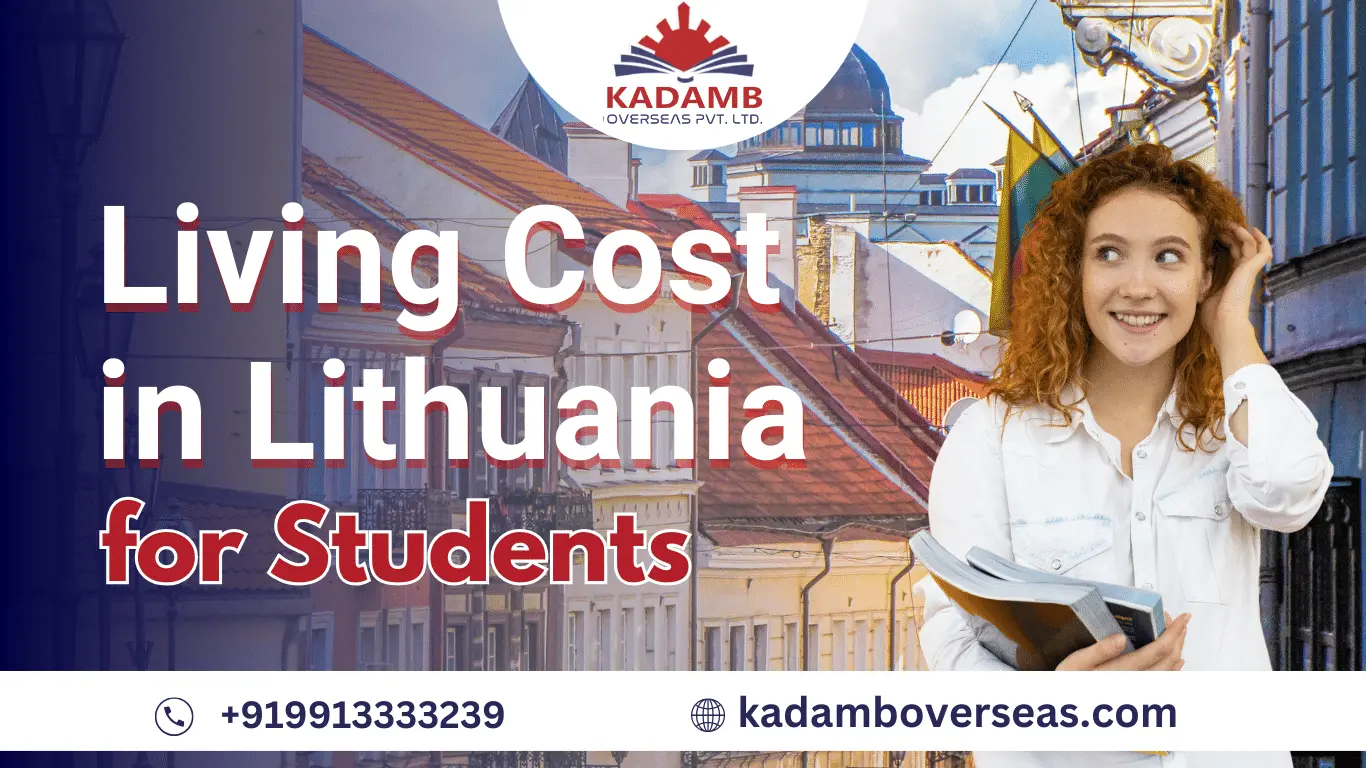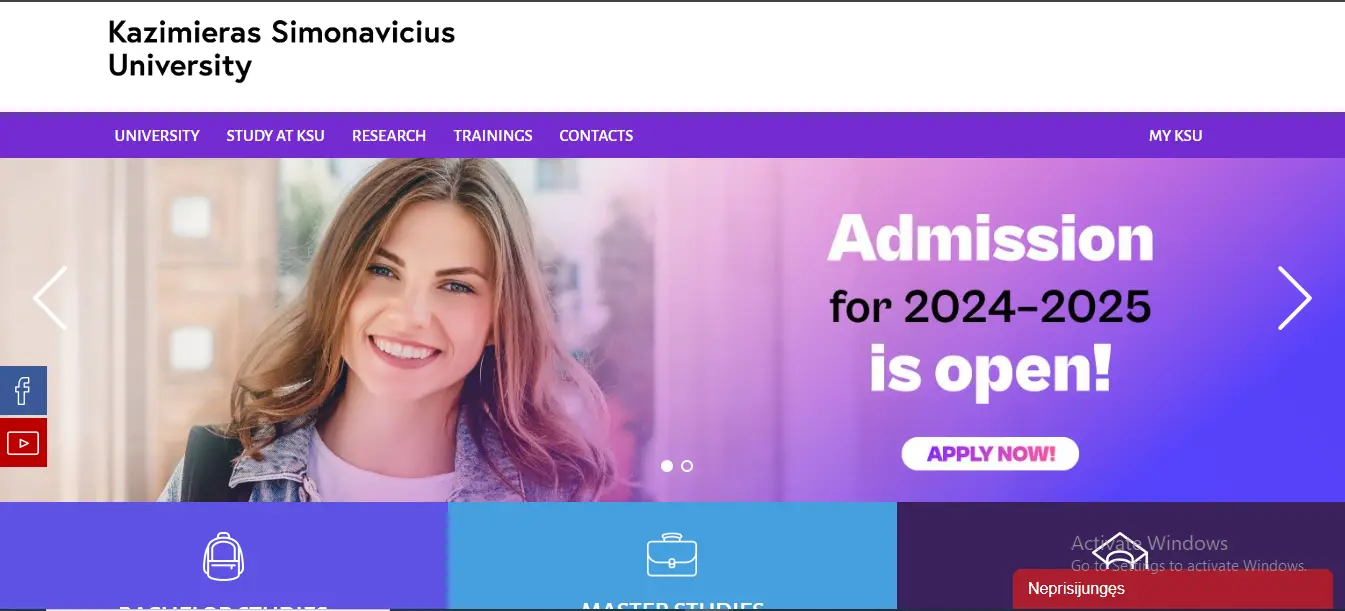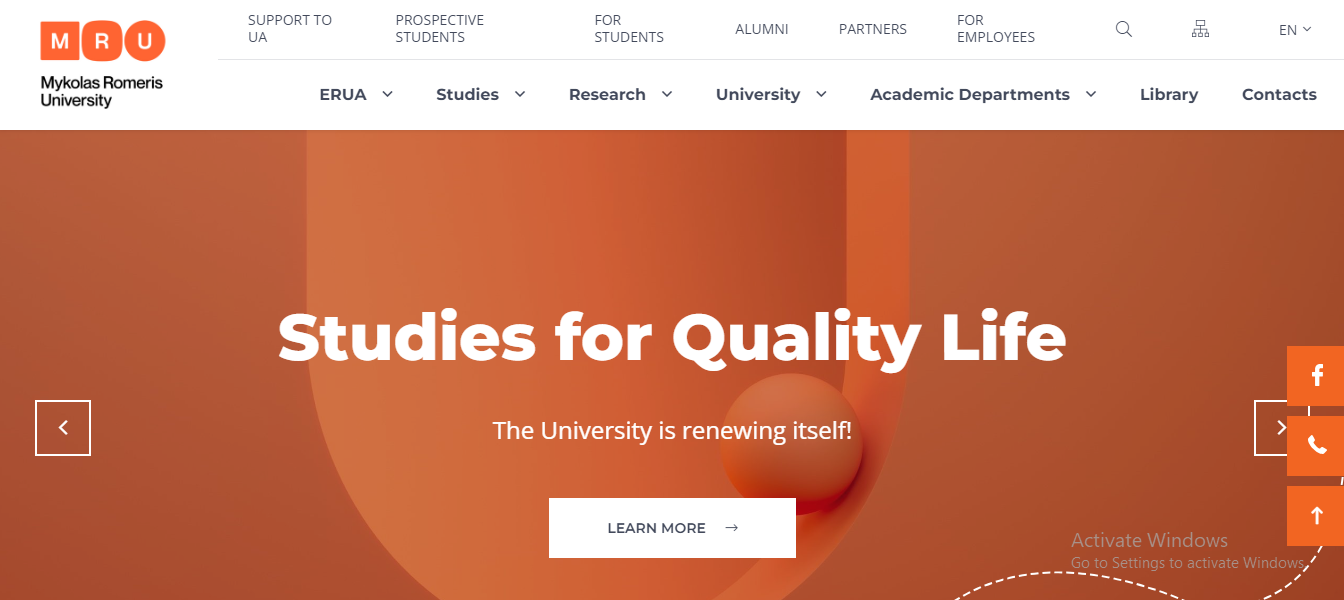Living cost is a crucial factor that international students consider when choosing a study destination. Lithuania is becoming an increasingly popular choice for international students due to its high-quality education system, diverse culture, and affordable living costs. In this article, we will explore the living cost in Lithuania for international students and provide a detailed breakdown of the expenses they can expect to incur during their stay.
- Living Costs in Lithuania for International Students
- Monthly Living Expenses in Lithuania for International Students
- Student Accommodation in Lithuania for Students
- Tuition Fees in Lithuania for International Students
- Scholarships in Lithuania for International Students
- Healthcare and Insurance Costs
- Part-Time Work Opportunities
- Budgeting Tips for Students
- Banking and Financial Services
- Cultural and Social Considerations
- Visa and Residence Permit Costs
- Living Costs in Lithuania for International Students
- Budgeting for Student Life
- Financial Aid and Scholarships
- Money-Saving Tips for Students
- Comparative Analysis
- Frequently Asked Questions
Lithuania has become an increasingly popular destination for international students in recent years. With its vibrant culture, affordable living costs, and high-quality education, it’s no surprise that more and more students are choosing Lithuania as their study abroad destination. However, before making the move, it’s important to understand the living costs and tuition fees associated with studying in Lithuania.
Living costs in Lithuania for international students vary depending on several factors, including location, lifestyle, and accommodation choices. On average, students can expect to spend around 400-600 EUR per month on living expenses, including accommodation, food, transportation, and other miscellaneous expenses. While this may seem like a lot, it’s important to note that Lithuania is significantly cheaper than many other European countries, making it an attractive option for budget-conscious students.
When it comes to student accommodation in Lithuania, there are several options available, including dormitories, shared apartments, and private rentals. The cost of accommodation varies depending on the location and type of housing, with dormitories being the most affordable option. However, many students prefer to live in shared apartments or private rentals for the added privacy and independence. It’s important to research and compare different accommodation options to find the best fit for your budget and lifestyle.
Living Costs in Lithuania for International Students
Lithuania is a great destination for international students seeking quality education at an affordable cost. The country offers a high standard of living at a relatively low cost compared to other European countries. The cost of living in Lithuania is determined by various factors such as accommodation, food, transport, and leisure activities.
Accommodation
International students have several options for accommodation in Lithuania. They can choose to live in a university dormitory or rent a private apartment. The cost of accommodation varies depending on the location, size, and type of accommodation. On average, students can expect to pay between €150-€400 per month for a shared apartment, while a private apartment can cost between €300-€800 per month.
Food
Food costs in Lithuania are relatively low compared to other European countries. International students can expect to spend between €150-€200 per month on groceries, depending on their eating habits. Eating out is also affordable, with a meal at a mid-range restaurant costing around €10-€15.
Transport
Public transport in Lithuania is efficient and affordable. International students can purchase a monthly public transport pass for around €20-€30. Taxis are also available, with a starting fare of €0.50 and a cost of €0.50 per kilometer.
Leisure Activities
Lithuania offers a range of leisure activities for international students. The cost of leisure activities varies depending on the activity. For example, a cinema ticket costs around €5-€7, while a gym membership costs around €30-€40 per month.
In conclusion, Lithuania offers a high standard of living at an affordable cost for international students. With careful budgeting, students can comfortably live and study in Lithuania without breaking the bank.
Monthly Living Expenses in Lithuania for International Students
Accommodation Costs
International students in Lithuania have several options for accommodation, including university dormitories, private apartments, and shared flats. The cost of accommodation varies depending on the location, type of accommodation, and amenities provided. On average, students can expect to pay around €200-€400 per month for a shared apartment or dormitory room. Private apartments can cost anywhere from €300 to €800 per month, depending on the location and size.
Food and Groceries
The cost of food and groceries in Lithuania is generally affordable. International students can save money by cooking their meals at home instead of eating out. A typical grocery bill for a student can range from €100-€150 per month. Eating out at a restaurant can cost around €10-€20 per meal.
Transportation
Public transportation in Lithuania is efficient and affordable, making it easy for international students to get around. A monthly student ticket for public transportation costs around €15-€20. Taxis and ride-sharing services are also available, with prices starting from €0.50 per kilometer.
Utilities and Connectivity
Utilities such as electricity, water, and internet are usually included in the cost of accommodation. However, some apartments may require students to pay for their own utilities. On average, students can expect to pay around €50-€100 per month for utilities and internet.
Entertainment and Leisure
Lithuania offers a variety of entertainment and leisure options for international students. Movie tickets cost around €5-€7, while a night out at a bar or club can cost around €10-€15. Students can also enjoy cultural events and festivals, many of which are free of charge.
Overall, the cost of living in Lithuania for international students is affordable compared to other European countries. By budgeting wisely and taking advantage of student discounts, students can enjoy a comfortable and enjoyable lifestyle while studying in Lithuania.
Student Accommodation in Lithuania for Students
Lithuania is a popular destination for international students, and finding suitable accommodation is an important consideration. There are different options available, including on-campus housing, off-campus housing, and short-term rentals.
On-Campus Housing
Many universities in Lithuania offer on-campus housing for students. This can be a convenient option, as it is often located close to campus and can provide a sense of community. The cost of on-campus housing varies depending on the university and the type of accommodation. Some universities offer shared rooms, while others offer private rooms or apartments. It is important to note that on-campus housing can be in high demand, so it is recommended to apply early.
Off-Campus Housing
Off-campus housing is another option for international students. There are many apartments and houses available for rent in Lithuania, and the cost varies depending on the location and the size of the accommodation. It is important to research the area and the landlord before signing a lease. Some universities offer assistance in finding off-campus housing, so it is recommended to check with the university’s international student office.
Short-Term Rentals
Short-term rentals, such as hostels or Airbnb, can be a good option for students who need temporary accommodation. This can be useful for students who are waiting for on-campus or off-campus housing to become available. However, short-term rentals can be more expensive than other options, and it is important to consider the location and the amenities provided.
In conclusion, there are different options available for international students looking for accommodation in Lithuania. It is important to research and consider all options before making a decision.
Tuition Fees in Lithuania for International Students
Undergraduate Programs
Lithuania offers affordable tuition fees for international students who wish to pursue undergraduate programs. The tuition fees for undergraduate programs in Lithuania range from €1,500 to €5,000 per year, depending on the program and the university.
It is important to note that some universities in Lithuania offer scholarships to international students based on their academic performance. These scholarships can cover up to 100% of the tuition fees.
Postgraduate Programs
The tuition fees for postgraduate programs in Lithuania are slightly higher than those for undergraduate programs. The fees range from €2,000 to €8,000 per year, depending on the program and the university.
Similar to undergraduate programs, some universities in Lithuania offer scholarships to international students pursuing postgraduate programs. These scholarships can cover up to 100% of the tuition fees.
It is recommended that international students research the tuition fees and scholarships available for their desired program and university before applying to ensure they can afford the cost of education in Lithuania.
Overall, Lithuania offers affordable tuition fees for international students, making it an attractive destination for those seeking quality education at an affordable price.
Scholarships in Lithuania for International Students
International students studying in Lithuania have access to a variety of scholarships and financial aid opportunities to help offset the cost of tuition and living expenses. Below are some options available for eligible students:
Lithuanian Government Scholarships
The Lithuanian government offers scholarships to international students who wish to pursue a Bachelor’s, Master’s, or PhD degree in Lithuania. The scholarship covers tuition fees, monthly allowances, and accommodation expenses. The application process for the scholarship typically opens in January and closes in May.
Erasmus+ Program
The Erasmus+ program is a European Union initiative that provides funding for students to study abroad in participating countries. The program covers tuition fees, travel expenses, and a monthly allowance for living expenses. Students can apply for the Erasmus+ program through their home university.
University Scholarships
Many universities in Lithuania offer scholarships to international students based on academic merit or financial need. These scholarships can cover tuition fees, living expenses, or both. Students can inquire about scholarship opportunities directly with their university.
Private Scholarships
There are also private organizations and foundations in Lithuania that offer scholarships to international students. These scholarships may have specific eligibility requirements or be awarded based on academic achievement, community involvement, or other criteria. Students can search for private scholarship opportunities through online databases or by contacting the organizations directly.
Overall, international students in Lithuania have access to a range of scholarships and financial aid options to help make their studies more affordable. By exploring these opportunities and applying early, students can maximize their chances of receiving financial support.
Healthcare and Insurance Costs
International students studying in Lithuania are required to have health insurance during their stay. The cost of health insurance for students in Lithuania is relatively low, with an average monthly premium of around €20-€30. This cost may vary depending on the insurance provider and the coverage offered.
In addition to health insurance, students may also need to pay for medical expenses out of pocket. The cost of medical care in Lithuania is generally affordable, with a standard doctor’s visit costing around €20-€30. However, more complex medical procedures may be more expensive.
It is important to note that international students who are citizens of the European Union or European Economic Area are entitled to free or reduced-cost healthcare in Lithuania, provided they have a European Health Insurance Card (EHIC). Non-EU/EEA students are not eligible for this benefit and must have private health insurance.
Overall, the cost of healthcare and insurance for international students in Lithuania is relatively low compared to other European countries. However, it is still important for students to budget for these expenses to ensure they have adequate coverage and access to medical care during their stay.
Part-Time Work Opportunities
International students in Lithuania have the option of working part-time to support themselves financially. The Lithuanian government allows international students to work up to 20 hours per week during the academic year and full-time during holidays.
There are various part-time job opportunities available for international students in Lithuania. Some of the common jobs include working in cafes, restaurants, supermarkets, and hotels. Students can also find part-time jobs in their respective fields of study.
The average hourly wage for part-time jobs in Lithuania is around €5-€6. However, the wages may vary depending on the job and the employer. It is important to note that the wages earned from part-time jobs may not be sufficient to cover all the living expenses.
International students can find part-time job opportunities through university career centers, job portals, and social media platforms. It is important to have a good knowledge of the Lithuanian language to increase the chances of finding a job.
In conclusion, international students in Lithuania have the option of working part-time to support themselves financially. There are various part-time job opportunities available in Lithuania, and students can find them through various sources. However, it is important to keep in mind that the wages earned from part-time jobs may not cover all the living expenses.
Budgeting Tips for Students
International students studying in Lithuania may find it challenging to manage their finances while living in a new country. However, with some budgeting tips, students can make the most of their money and enjoy their study abroad experience without financial stress.
Accommodation
One of the biggest expenses for international students is accommodation. It is important to research and compare different options, such as university dormitories, private apartments or shared flats. Students can save money by choosing a shared accommodation option with other students. Additionally, they can look for accommodations located further from the city center, which are usually cheaper.
Food and Groceries
International students can save money on food and groceries by cooking at home instead of eating out. They can also buy groceries in bulk and plan meals ahead of time to avoid wasting food. It is recommended to shop at local markets and supermarkets, where prices are generally lower than in convenience stores.
Transportation
Public transportation is affordable and efficient in Lithuania. International students can save money by purchasing a monthly pass instead of buying single tickets. Additionally, they can consider cycling or walking to their destination, which is not only cost-effective but also a great way to explore the city.
Entertainment
There are many free or low-cost entertainment options available for students in Lithuania. They can visit museums, parks, and beaches or attend cultural events and festivals. It is also recommended to take advantage of student discounts offered by cinemas, theaters, and other entertainment venues.
By following these budgeting tips, international students can manage their finances effectively and enjoy their study abroad experience in Lithuania without financial stress.
Also Read: Lithuania vs. Other European Destinations for Indian Students
Banking and Financial Services
International students studying in Lithuania will find it easy to access banking and financial services. The country has a well-developed banking system with a range of services and products available. Most banks in Lithuania offer online banking services, making it easy for students to manage their finances from anywhere.
Opening a bank account in Lithuania is a straightforward process that can be completed within a few days. To open an account, international students will need to provide their passport, proof of address, and proof of enrollment in a Lithuanian university or college.
Students can use their bank accounts to receive their stipends, pay bills, and make online purchases. It is also possible to withdraw cash from ATMs using a debit or credit card. However, it is important to note that some banks may charge a fee for using ATMs that are not affiliated with their network.
International students can also take advantage of other financial services such as student loans, credit cards, and insurance. It is recommended that students research and compare different options before choosing a provider to ensure they get the best deal.
Overall, international students studying in Lithuania can expect to have access to a range of banking and financial services that will help them manage their finances efficiently and effectively.
Cultural and Social Considerations
Living in Lithuania as an international student can be a unique and enriching experience. However, it is important to consider the cultural and social differences that may arise. Here are some key factors to keep in mind:
Language
The official language of Lithuania is Lithuanian, which is spoken by the majority of the population. While many Lithuanians also speak English, it is still recommended that international students learn some basic Lithuanian phrases to help them navigate daily life.
Food
Lithuanian cuisine is known for its hearty and filling dishes, often featuring meat, potatoes, and dairy products. Vegetarian and vegan options are available, but may be limited in some areas. International students should also be aware that dining out can be expensive, so cooking at home may be a more budget-friendly option.
Social norms
Lithuanians tend to be reserved and formal in public settings, but can be warm and hospitable in private. It is important to be respectful of local customs, such as removing shoes when entering someone’s home or addressing elders with proper titles.
Holidays and traditions
Lithuania has a rich cultural heritage, with many holidays and traditions that may be unfamiliar to international students. Some notable celebrations include Kaziuko mugė, a spring fair featuring traditional crafts and food, and Joninės, a midsummer festival with bonfires and dancing.
By being aware of these cultural and social considerations, international students can better integrate into Lithuanian society and make the most of their study abroad experience.
Visa and Residence Permit Costs
International students who wish to study in Lithuania must obtain a visa and a residence permit. The cost of obtaining these documents varies depending on the type of visa and the length of stay.
Visa Costs
The cost of a Lithuanian visa for international students varies depending on the type of visa and the duration of stay. The following table provides a breakdown of visa costs:
| Type of Visa | Duration of Stay | Cost |
|---|---|---|
| Short-term visa | Up to 90 days | €60 |
| Long-term visa | More than 90 days | €120 |
It is important to note that visa fees are non-refundable, even if the visa application is denied.
Residence Permit Costs
International students who plan to stay in Lithuania for more than 90 days must obtain a residence permit. The cost of obtaining a residence permit depends on the duration of stay and the type of permit. The following table provides an overview of residence permit costs:
| Type of Permit | Duration of Stay | Cost |
|---|---|---|
| Temporary residence permit | Up to 1 year | €100 |
| Temporary residence permit | 1-2 years | €150 |
| Temporary residence permit | 2-3 years | €200 |
| Temporary residence permit | 3-4 years | €250 |
| Temporary residence permit | 4-5 years | €300 |
| Temporary residence permit | N/A | €400 |
It is important to note that the cost of obtaining a residence permit does not include any additional fees that may be required, such as health insurance or biometric data collection.
In conclusion, international students who wish to study in Lithuania should be aware of the visa and residence permit costs associated with their stay. It is recommended that students plan ahead and budget accordingly to avoid any unexpected expenses.
Frequently Asked Questions
You can apply for a permanent residency permit in Lithuania once you have been a resident for five years straight with a valid temporary residence permit.
Universities in Lithuania require an average score of 65–105 on the TOEFL and a minimum of 5.5–6.5 on the IELTS. The ability to sustain oneself financially while pursuing their education in Lithuania must be demonstrated by the students.
If a student speaks English, they do not need to take the IELTS exam. There are lodging options nearby that are accessible by foot. Savor the superior infrastructure and high standard of living. A portion of a contemporary European nation.
A financial budget of €700 to €1,000 per month is recommended for a comfortable student life in Lithuania. This includes accommodation, food, transportation, and other basic expenses. However, the actual budget may vary depending on the lifestyle of the student.
The most affordable universities in Lithuania for international students are Vilnius Gediminas Technical University, Vilnius University, and Kaunas University of Technology. However, the tuition fees may vary depending on the program and university.
Yes, international students can work part-time in Lithuania. They can work up to 20 hours per week during the academic year and full-time during holidays. The minimum wage in Lithuania is €607 per month, but the actual earnings may vary depending on the job and employer.
The typical accommodation expenses for students in Lithuania range from €150 to €400 per month, depending on the type of accommodation and location. Shared apartments and dormitories are usually cheaper than private apartments.
Tuition fees for international students at public universities in Lithuania range from €1,500 to €4,000 per year, depending on the program and university. Private universities may have higher tuition fees.
The average monthly living cost for an international student in Lithuania ranges from €500 to €800. This includes accommodation, food, transportation, and other basic expenses. However, the cost may vary depending on the city and lifestyle of the student.





